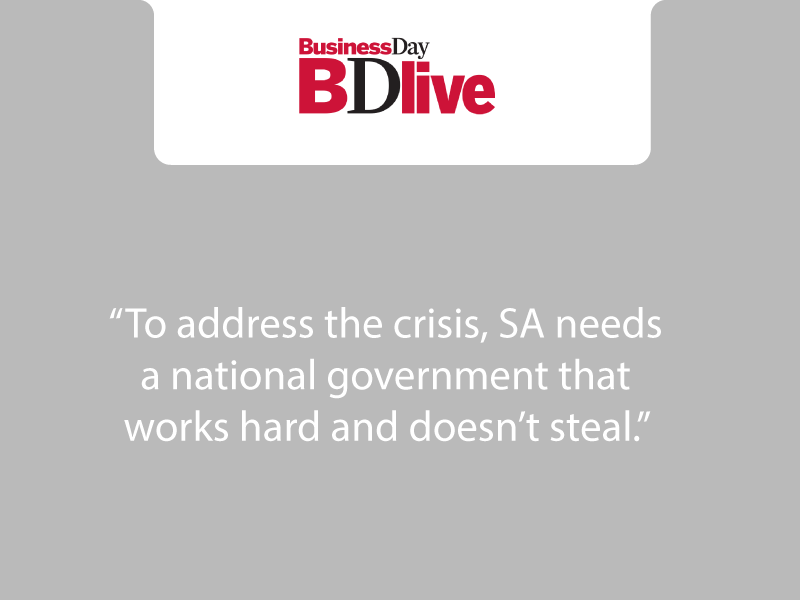 SA has never faced as many, as intractable and as mutually reinforcing a set of crises as it does now. Everything from poverty rates and political fractures to our catastrophic fiscal and employment crises is worse than it has ever been.
SA has never faced as many, as intractable and as mutually reinforcing a set of crises as it does now. Everything from poverty rates and political fractures to our catastrophic fiscal and employment crises is worse than it has ever been.
We were on the road to this destination in 2019, but Covid-19 has accelerated the descent. In this complex, volatile environment, business will need to be exceptionally strategic if it is to help push SA towards decisive action for growth and jobs. Market-orientated recommendations must not be seen as one among many recovery strategies, but as the most plausible pathway to faster growth.
With corrupt factions circling the president and the populist Left mobilising hard, one can see how the most important business proposals could be lost or even how business might find itself scapegoated for SA’s manifold failures. So what should business do next?
First, it needs to communicate to the country, to the government, the cabinet and the president how very serious things are — even though it may harm the president politically.
SA faces an existential crisis. But when you listen to senior people in the ANC and cabinet, it is clear that far too many of them do not appreciate just how close the country is to irreversible economic decline. The consequences for all South Africans of the loss of jobs and income, of declining tax revenues and of the breakdown of the welfare state, need to be communicated in ways that no-one can deny or ignore.
This is not the time for business to obfuscate what it really thinks the country needs to do, and not a time to “go along to get along”. It has to find ways to communicate how bad things are for SA’s prospects and the consequences for everybody — not just business — if nothing significant changes.
Second, business has to make the case that SA cannot do more of the same. We have to rethink the attitudes and policies that have brought the country to this sorry state. None of the recovery strategies makes this point effectively. The time has come to think afresh. Tweaking old policies will not do the job, as the past two and a half years have made clear.
The most important issues that need to be rethought relate to the state, governance and the role of markets and the private sector. Our state is weak, corrupt and ineffective. At the same time, SA has a strong private sector that could be even more impressive if it were not restrained by policymakers’ unjustified belief in the merits of a commandist “developmental state”.
The state can be fixed, but it’s important to accept that this will take years — time we do not have. In every sector of our economy — agriculture, local government, food distribution or wherever you look — we have to free up private actors, the only capacity SA now has to build a bridge away from disaster.
There will be no recovery if the government’s anti-business attitudes and policies persist. The government-business relationship has to change: we need a state that seeks to enable business growth, not one that sees itself as being responsible for disciplining capital.
What business has done so far is to put forward the case for reforms that would make SA’s economy grow faster. But something important is missing. Business needs also to make the compelling case for a market-centred, private sector-driven strategy for recovery, growth and inclusion.
This is not a libertarian argument for a minimalist state. SA desperately needs a capable, honest state that can enable business growth and provide public goods and services that, in a highly unequal society, far too many people cannot provide for themselves. But to do this the state needs tax revenues. And to obtain that, business must flourish.
The case for a private sector-led approach to SA’s recovery is not evident to many outside of business, so this case cannot be assumed — it has to be made across the country and to every conceivable audience.
Third, in making its case for reform, business needs to stress that SA cannot fix everything at once (its own 1,000-page document notwithstanding). We need to pick some priorities, agree on how to get them done, do them, and use that momentum for the next round of achievable actions. For too long we have tried to do too much with too little capacity. Now is the time for urgent actions that point clearly to a fresh start. Four suggest themselves:
- The immediate development of emergency provisions to free up the economy and allow new firms to grow quickly. About 12-million people may be unemployed by now, and we are in desperate need of reforms that will allow firms to create as many jobs as possible.
- Without resolution of the deep crises in the energy sector, we cannot make economic progress. We need speedy action to unlock licensing of generation capacity, the opening of the fifth procurement window for renewable energy, and the unbundling of Eskom.
- New and effective measures to fight corruption must be implemented. Whether it is emergency courts, the creation of new offences or additional use of private sector legal capacity, SA has to show it is serious about fighting corruption. Everyone — except well-placed crooks — has an interest in stopping this evil.
- Business should be calling for reform and expansion of the public works programme. We cannot create all the jobs we need immediately, and publicly funded jobs could play a key role in creating opportunities. There are limits to what this can achieve, but a well thought-through programme could help many people at a time of great hardship.
We must recognise that merely having priorities is not enough. Business needs a more effective strategy to shape the debate. Summits and talk shops do not work. Finding the lowest common denominator between competing interests will not be sufficient to get SA out of trouble. Business has to make it clear that presidential leadership is vital, and that compacting without leadership is inadequate.
Business has staked itself to the president, but it has not had nearly enough influence on his thinking on reform, or during the lockdown. It needs to reflect more deeply about SA’s political economy and the wider society than on how to persuade one or two key people in the government. Politics does not work like that. Reform will not happen through reason alone.
Business needs to up the public pressure for reform. It should aim to shape the public debate, not merely contribute to it. This will require using all of its available resources and possible “voices”, all of its networks and potent marketing expertise.
SA is in trouble. Can business make the case for market-based reform much more persuasively? Can it persuade others that supporting a market-led recovery would accelerate growth and that, in time, this would empower millions more people? Can it get the president to lead and put national interests ahead of ANC unity? One can only hope — the alternatives all look terrible.
• Bernstein is executive director of the Centre for Development and Enterprise.
Article published by the Business Day




